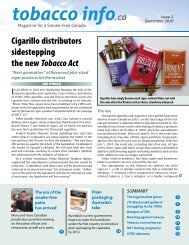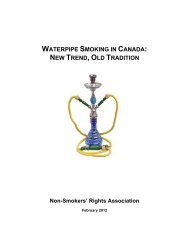Tobacco-Free Sports and Recreation Policies
Tobacco-Free Sports and Recreation Policies - New Brunswick Anti ...
Tobacco-Free Sports and Recreation Policies - New Brunswick Anti ...
You also want an ePaper? Increase the reach of your titles
YUMPU automatically turns print PDFs into web optimized ePapers that Google loves.
<strong>Tobacco</strong>-<strong>Free</strong> <strong>Sports</strong> <strong>and</strong> <strong>Recreation</strong> <strong>Policies</strong><br />
THE WAY FORWARD<br />
A single approach may not be possible in all settings given varied contextual factors such as<br />
management structure, arena or venue ownership, SFOA jurisdiction, volunteer availability <strong>and</strong><br />
location (especially rural). Implementation needs the engagement of management/leaders, a<br />
broad reach (beyond single teams) <strong>and</strong> enough resources at the local level to support policy<br />
awareness (e.g., policy reminders, tobacco-free events, logos/promotional materials, signage/<br />
advertising, swag for players). 6<br />
The following recommendations are based on common themes across the case studies.<br />
Revisit the Policy<br />
A key focus moving forward is to ensure that hockey teams include a specific protocol for<br />
addressing team policies <strong>and</strong> codes of conduct on a regular (annual) basis. This annual review<br />
would include the TFSR policy, its content <strong>and</strong> enforcement.<br />
In addition, a well-funded (reinforcement/ training) TFSR policy program is needed to maintain<br />
awareness among current coaches/staff <strong>and</strong> hockey organizations <strong>and</strong> to orient new coaches<br />
<strong>and</strong> staff to the policy <strong>and</strong> implementation. This will also shift reliance from PHU staff, including<br />
youth workers, who have been the primary advocates <strong>and</strong> communicators of these policies.<br />
Emphasise Health <strong>and</strong> Lifestyle<br />
Health <strong>and</strong> healthy lifestyle choices were a common impetus for adopting a TFSR policy.<br />
Therefore, strategies to work with local hockey arenas should focus on, or continue to<br />
emphasise, the health message first as it seems to be the most compelling reason for smokefree<br />
sports <strong>and</strong> recreation policies (e.g., vehicles could include a social marketing campaign that<br />
integrates physical activity <strong>and</strong> tobacco-free policy promotion).<br />
6 The Ontario Soccer Association (OSA) is an example of an organization-wide concerted effort to implement TFSR policies in<br />
the club system. The OSA used their 2010 PLBTF seed grant in part to ensure that tobacco-free team policies were<br />
developed as part of their Club Excellence Award criteria. (Accessed June 11 th 2012 from<br />
http://www.playlivebetobaccofree.ca/Sport/Success-Stories.aspx). The number of soccer clubs that have adopted a TFSR<br />
policy has increased: fifteen soccer clubs in 2011 <strong>and</strong> another twenty-two clubs in 2012 (Personal communication,<br />
M.Greenwood, June 15 th 2012).<br />
Ontario <strong>Tobacco</strong> Research Unit 63





